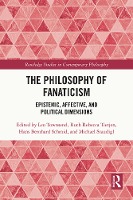The essays in this volume explore some of the disconcerting realities of fanaticism, by analyzing its unique dynamics, and considering how it can be productively confronted. The book features both analytic and continental philosophical approaches to fanaticism.
Working at the intersections of epistemology, philosophy of emotions, political philosophy, and philosophy of religion, the contributors address a range of questions related to this increasingly relevant, yet widely neglected topic. What are the distinctive features of fanaticism? What are its causes, motivations, and reasons? In what ways, if at all, is fanaticism epistemically, ethically, and politically problematic? And how can fanaticism be combatted or curtailed?
The Philosophy of Fanaticism will be of interest to scholars and advanced students working in epistemology, philosophy of religion, philosophy of emotions, moral psychology, and political philosophy.

